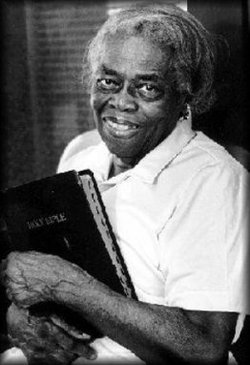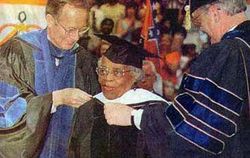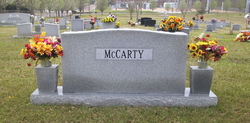Oseola McCarty
O1996 — Feature Writing

O1996 — Feature Writing

All She Has- $150,000 -Is Going to a University
August 13, 1995
| HATTIESBURG, Miss., Aug. 10 Oseola McCarty spent a lifetime making other people look nice. Day after day, for most of her 87 years, she took in bundles of dirty clothes and made them clean and neat for parties she never attended, weddings to which she was never invited, graduations she never saw. She had quit school in the sixth grade to go to work, never married, never had children and never learned to drive because there was never any place in particular she wanted to go. All she ever had was the work, which she saw as a blessing. Too many other black people in rural Mississippi did not have even that. She spent almost nothing, living in her old family home, cutting the toes out of shoes if they did not fit right and binding her ragged Bible with Scotch tape to keep Corinthians from falling out. Over the decades, her pay -- mostly dollar bills and change -- grew to more than $150,000. "More than I could ever use," Miss McCarty said the other day without a trace of self-pity. So she is giving her money away, to finance scholarships for black students at the University of Southern Mississippi here in her hometown, where tuition is $2,400 a year. "I wanted to share my wealth with the children," said Miss McCarty, whose only real regret is that she never went back to school. "I never minded work, but I was always so busy, busy. Maybe I can make it so the children don't have to work like I did." People in Hattiesburg call her donation the Gift. She made it, in part, in anticipation of her death. As she sat in her warm, dark living room, she talked of that death matter-of-factly, the same way she talked about the possibility of an afternoon thundershower. To her, the Gift was a preparation, like closing the bedroom windows to keep the rain from blowing in on the bedspread. "I know it won't be too many years before I pass on," she said, "and I just figured the money would do them a lot more good than it would me." Her donation has piqued interest around the nation. In a few short days, Oseola McCarty, the washerwoman, has risen from obscurity to a notice she does not understand. She sits in her little frame house, just blocks from the university, and patiently greets the reporters, business leaders and others who line up outside her door. "I live where I want to live, and I live the way I want to live," she said. "I couldn't drive a car if I had one. I'm too old to go to college. So I planned to do this. I planned it myself." It has been only three decades since the university integrated. "My race used to not get to go to that college," she said. "But now they can." When asked why she had picked this university instead of a predominantly black institution, she said, "Because it's here; it's close." While Miss McCarty does not want a building named for her or a statue in her honor, she would like one thing in return: to attend the graduation of a student who made it through college because of her gift. "I'd like to see it," she said. Business leaders in Hattiesburg, 110 miles northeast of New Orleans, plan to match her $150,000, said Bill Pace, the executive director of the University of Southern Mississippi Foundation, which administers donations to the school. "I've been in the business 24 years now, in private fund raising," Mr. Pace said. "And this is the first time I've experienced anything like this from an individual who simply was not affluent, did not have the resources and yet gave substantially. In fact, she gave almost everything she has. "No one approached her from the university; she approached us. She's seen the poverty, the young people who have struggled, who need an education. She is the most unselfish individual I have ever met." Although some details are still being worked out, the $300,000 -- Miss McCarty's money and the matching sum -- will finance scholarships into the indefinite future. The only stipulation is that the beneficiaries be black and live in southern Mississippi. The college has already awarded a $1,000 scholarship in Miss McCarty's name to an 18-year-old honors student from Hattiesburg, Stephanie Bullock. Miss Bullock's grandmother, Ledrester Hayes, sat in Miss McCarty's tiny living room the other day and thanked her. Later, when Miss McCarty left the room, Mrs. Hayes shook her head in wonder. "I thought she would be some little old rich lady with a fine car and a fine house and clothes," she said. "I was a seamstress myself, worked two jobs. I know what it's like to work like she did, and she gave it away." The Oseola McCarty Scholarship Fund bears the name of a woman who bought her first air-conditioner just three years ago and even now turns it on only when company comes. Miss McCarty also does not mind that her tiny black-and-white television set gets only one channel, because she never watches anyway. She complains that her electricity bill is too high and says she never subscribed to a newspaper because it cost too much. The pace of Miss McCarty's walks about the neighborhood is slowed now, and she misses more Sundays than she would like at Friendship Baptist Church. Arthritis has left her hands stiff and numb. For the first time in almost 80 years, her independence is threatened. "Since I was a child, I've been working," washing the clothes of doctors, lawyers, teachers, police officers, she said. "But I can't do it no more. I can't work like I used to." She is 5 feet tall and would weigh 100 pounds with rocks in her pockets. Her voice is so soft that it disappears in the squeak of the screen door and the hum of the air-conditioner. She comes from a wide place in the road called Shubuta, Miss., a farming town outside Meridian, not far from the Alabama line. She quit school, she said, when the grandmother who reared her became ill and needed care. "I would have gone back," she said, "but the people in my class had done gone on, and I was too big. I wanted to be with my class." So she worked, and almost every dollar went into the bank. In time, all her immediate family died. "And I didn't have nobody," she said. "But I stayed busy." She took a short vacation once, as a young woman, to Niagara Falls. The roar of the water scared her. "Seemed like the world was coming to an end," she said. She stayed home, mostly, after that. She has lived alone since 1967. Earlier this year her banker asked what she wanted done with her money when she passed on. She told him that she wanted to give it to the university, now rather than later; she set aside just enough to live on. She says she does not want to depend on anyone after all these years, but she may have little choice. She has been informally adopted by the first young person whose life was changed by her gift. As a young woman, Stephanie Bullock's mother wanted to go to the University of Southern Mississippi. But that was during the height of the integration battles, and if she had tried her father might have lost his job with the city. It looked as if Stephanie's own dream of going to the university would also be snuffed out, for lack of money. Although she was president of her senior class in high school and had grades that were among the best there, she fell just short of getting an academic scholarship. Miss Bullock said her family earned too much money to qualify for most Federal grants but not enough to send her to the university. Then, last week, she learned that the university was giving her $1,000, in Miss McCarty's name. "It was a total miracle," she said, "and an honor." She visited Miss McCarty to thank her personally and told her that she planned to "adopt" her. Now she visits regularly, offering to drive Miss McCarty around and filling a space in the tiny woman's home that has been empty for decades. She feels a little pressure, she concedes, not to fail the woman who helped her. "I was thinking how amazing it was that she made all that money doing laundry," said Miss Bullock, who plans to major in business. She counts on Miss McCarty's being there four years from now, when she graduates. |
© 1995, The New York Times



























No comments:
Post a Comment